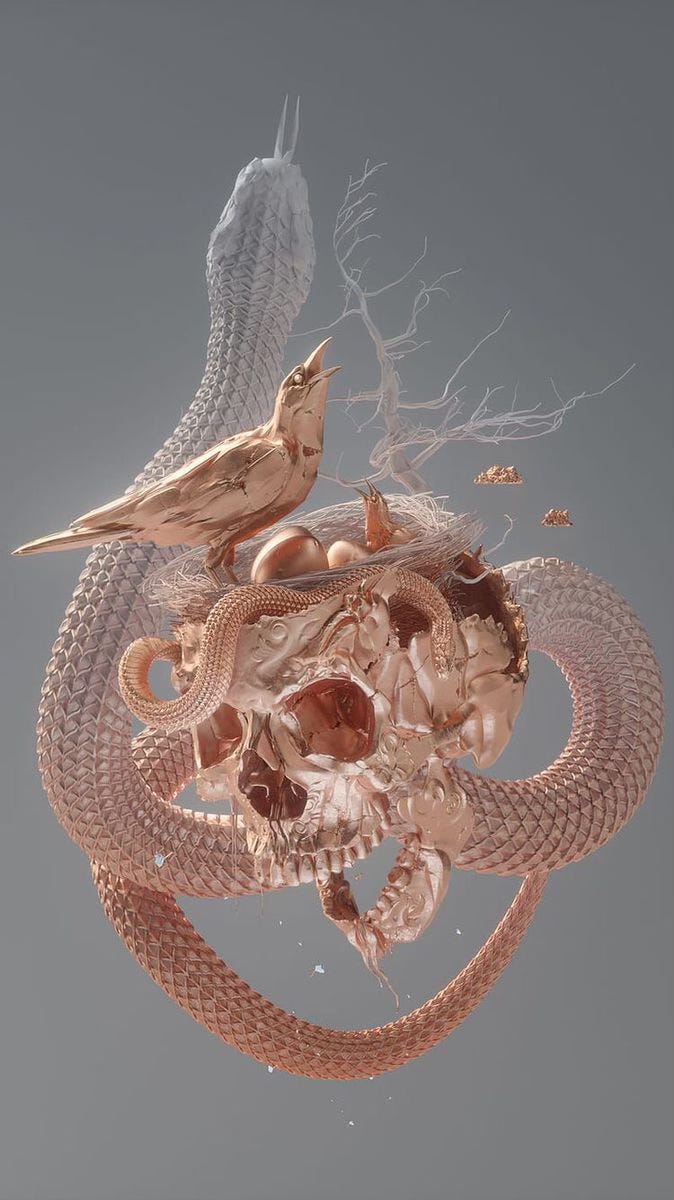Dying may be inevitable but truly living escapes most
Why so many of us are afraid of our own happiness
As a child who grew up in a pentecostal evangelical paradigm, the concept of death was not only ever present, it was TERRIFYING.
The infamous Jonathan Edwards sermon “Sinners in the Hands of an Angry God” (circa 1741) was as deeply revered by our parents and spiritual communities as the Thief in the Night films (1973-1983), productions of Heaven’s Gates and Hell’s Flames (1981 as a play, 1986 on film), This Present Darkness (1986) and its sequel - Piercing the Darkness (1989), and the Left Behind series (1995-2007), all of which traumatized a great many in my generation (Gen X).
And it was no accident. It was absolutely intended to be scary.
Christians had no problems with these titles being included in the genre of horror because they genuinely believed they had an edict from God to warn the world of what was awaiting them without salvation. “TURN OR BURN!” they’d say.
The only peace was allegedly to be found in “getting right with God” and then getting others to do the same so no one was “left behind” when the rapture occurred at ANY moment.
Every loud noise had us listening for a “trumpet blast” calling us “home,” and if we found ourselves walking into an empty house, we looked for clothes on the floor left by our loved ones who had been “taken up.”
Even normative childhood enjoyments were scrutinized for possible Satanic activity (e.g., Saturday morning cartoons, secular music, rhyming games).
If you THOUGHT you might be guilty of sin, however accidental, it was important to get right with God as quickly as possible.
And for those who also grew up in the denominational conflict between Calvinism and Arminianism, my sympathies. That sh$% sucked major a$$ and no one was safe from righteously dignified bullying.
Fast forward 20 years or so, and for those who’ve left organized religion behind (... every pun intended here…), even as adults, the scars remain and can be surprisingly tender at times. Symptoms show up in every area of life due to what many are now calling complex trauma/ C-PTSD, sometimes with a qualifier of religious trauma syndrome.
From being unprepared to handle ambiguity in general as fundamentalism offers quick, black-and-white, concrete feeling answers for pretty much anything to the loneliness from taking oneself out of the perceived safety of the herd (even if you no longer resonate with it), to sexual naivete and discomfort (let alone, dyspareunia and vaginismus), to a struggle in business with feast or famine cycles that are easily traced back to narratives such as “you will not be blessed if you’re outside the umbrella of God’s will” and MUCH MORE.
Most therapists are unprepared to deal with these topics as it’s not often covered in graduate programs, and depending on the area in which they’re practicing, can be a blind spot due to cultural homogeneity. We simply expect that adults, unlike their former childhood selves, are now comfortable making rational autonomous decisions if they can see the evidence contrasting any emotional flashbacks.
It’s just NOT the case.
Deconstruction as they say, is only the beginning of a healing journey. Many find it useful to add in things like:
somatic therapies aimed at helping regulate an overly taxed nervous system
cultivating new communities that feel safe and supportive of diversity
rediscovering a sense of purpose that isn’t predicated upon a punitive divine being’s will
Dying may be inevitable but truly living escapes most, and for those of us who grew up with rigid, controlling, religious worldviews, the concept of humanistic pleasure wasn’t even on our radar outside of sin.
But what if pleasure could be not just HEALING but ACTIVISM?
I invite you to consider the value in your enjoyment. What if you could spur others on to their highest fulfillment of potential by encouraging their passion?
What if hedonism truly is the birthplace of peace and not its undoing?
What if that which brings you pleasure also ensures you won’t die without knowing if you lived this life for you?
“And I'm sorry to my mama
But I'ma live the way I wanna
So I know this life was mine in the end”
~ Alana Springsteen




